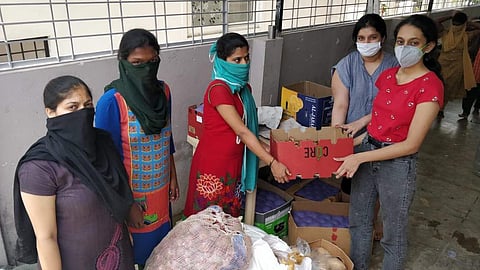

A watery dal for meals is not just devoid of taste but also bereft of the much-needed protein and iron that your body needs. And girls, we all know how important iron is for our menstrual health. For those underprivileged girls who don't know this, Ananya Talluri is already working very hard for you. The 17-year-old's efforts have been appreciated via the recent Diana Award that she won and has only propelled her forward towards her mission to bridge the nutritional gap at the receiving end of which are underprivileged girls. "In fact, it was this gap that got me thinking about what I can do, something that I noticed while visiting government schools as a part of 1M1B Foundation's Future Leaders programme," shares Ananya who is currently in Boston, USA, the city where she was also born.
The initial plan under project Svaasthya was to work via government schools but COVID cornered them into improvising. Thus, they thought of starting with orphanages in Hyderabad, the city where Ananya was brought up and is still based, along with her co-founder Anvitha Jampana. What they aimed to do was get blood tests done for the girls, consult a doctor for iron and multivitamin supplements and supply it to them. The duo also decided to supply groceries so that the girls get better quality meals and conduct two awareness/follow-up sessions per month. The idea took its present shape in April 2020, but its execution was a challenge. "We would call orphanages and none of them were ready to take us seriously," rues the student. But when Maruti Orphanage for Girls (now closed) came around, they were able to impact 106 girls there.
After the blood tests were conducted at the orphanage, the reports were taken to Anvitha's father, who works at CARE Hospitals, whom they consulted. Accordingly, a course of supplements for three months was provided to each girl as per their needs. "Plus, what we did during the sessions was give very basic information like which foods provide what nutrition, with relatable examples like a packet of chips vs dal or rajma. We also spoke extensively about menstrual health beyond sanitary napkins and followed up with them about their supplements. We would conduct two to three sessions per month. Though we tried conducting these sessions online, we switched to in-person sessions because we felt the latter was more impactful," explains the student of CHIREC International School.
They did see a significant improvement in the girls when they conducted the second round of blood tests. Next, they have spoken to Shishu Mangal Orphanage Home For Girls And Boys and Cheers Foundation and intend to start working with them very soon. Till date, they have impacted about 106 children via their grocery kits and supplements. The idea is to spread awareness so that, going forward, the girls are able to take care of their nutrition on their own, with special focus on iron. So far, they have impacted 120 girls and are in talks to impact 140 more.
"The whole experience has been very rewarding for me as I sharpened my communication and collaboration, I also realised how important it is to have a good rapport with caretakers of orphanages," shares Ananya who is up for more learning to come her way.
Why iron deficiency needs our attention
- Due to loss of blood during menstruation, women often suffer from iron deficiency
- As much as 1 mg of iron is lost during just one day of menstruation
- Iron works with other substances to create haemoglobin, the compound that carries oxygen
- Women need more iron in their diet. While men need 8 mg, women need up to 18
- Vitamin D and B12 are other deficiencies common among women
